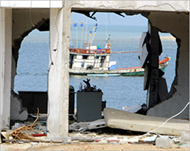Tsunami suing case heavily criticised
Lawsuits against Thailand, US weather forecasters and a luxury resort over the South Asian tsunami disaster are fuelling calls for greater curbs on what critics say are frivolous cases brought by lawyers out to make a quick buck.

The latest lawsuit suggests the Thai government and the US National Oceanic and Atmospheric Administration, which operates a Tsunami Warning Centre in Hawaii, should have issued warnings.
It also said the Sofitel Magic Lagoon Resort, located at Khao Lak Beach in Phuket and which is owned by the French Accor group, had a duty to be equipped with state of the art seismological and oceanographic detection equipment so guests could be warned of impending dangers.
While no damages are sought in the case – an action that could be taken later – it seeks information from the defendants about atmospheric warnings and steps taken to protect the public.
Reaction
The cases, brought on behalf of a group of tsunami victims, “perfectly illustrates” the need for US laws to hold lawyers liable for the economic damages they inflict on those they sue, said legal scholar Lester Brickman.
The petition was filed on Friday in a federal court in Manhattan by a lawyer who has been involved in a number of high profile compensation cases and is under investigation for ethics violations.
 |
|
Thailand is said not to have |
The lawyer, Edward Fagan, has said he would not take a fee for the case.
The government of Thailand has dismissed as groundless charges made in the case that it failed to warn people of the coming tsunami, thought to be the first to hit Thailand in 300 years.
The disaster left about 300,000 people dead or missing in Indonesia, Sri Lanka, India, Thailand, Malaysia, Myanmar, the Maldives, Bangladesh and East Africa. Hundreds of thousands lost their homes.
Criticism
Brickman, a professor of legal ethics at Benjamin Cardozo School of Law of Yeshiva University, called the tsunami case a “publicity-seeking fishing expedition”.
“When lawyers file suit solely for the purpose of furthering their financial interest, lawyers should be responsible for defendants’ costs when the suit is found to lack merit,” he said.
Victor Schwartz, general counsel to the American Tort Reform Association, added that he doubted the tsunami case would succeed but it would help bring attention to related legislation aimed at punishing lawyers who bring cases without merit.
The proposed Lawsuit Abuse Reduction Act was passed by the US House of Representatives last year and is now pending before the Senate.